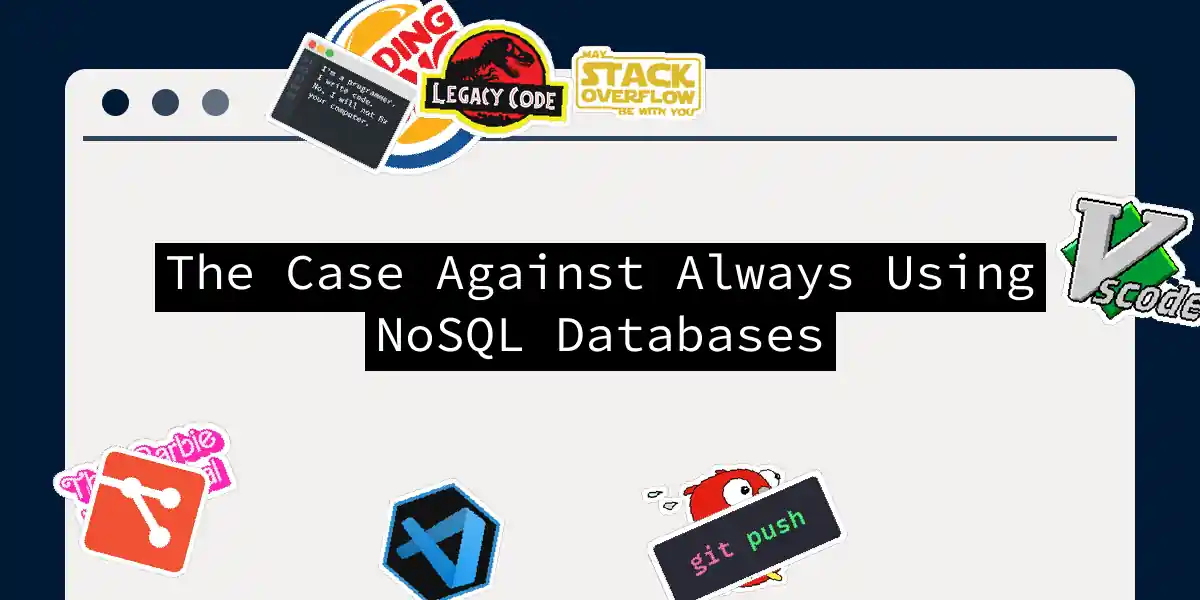When it comes to choosing the right database for your project, the debate between NoSQL and SQL databases can be as heated as a debate over the best pizza topping. While NoSQL databases have gained significant traction for their flexibility and scalability, they are not the silver bullet for every data storage need. Here’s why you might want to think twice before jumping on the NoSQL bandwagon.
Security Concerns
Security is a top priority for any database, and here, NoSQL databases often fall short. Unlike their SQL counterparts, NoSQL databases are generally more vulnerable to security issues. This is partly because the NoSQL ecosystem is still evolving, and many of the security features that are standard in SQL databases are either missing or not fully developed in NoSQL databases[1].
Imagine your database as a fortress. SQL databases have robust walls and a well-guarded entrance, while many NoSQL databases are still building their defenses. This doesn’t mean NoSQL databases are inherently insecure, but it does mean you need to be more vigilant and proactive in securing your data.
Data Consistency
One of the most significant drawbacks of NoSQL databases is their approach to data consistency. Unlike SQL databases, which adhere to the ACID (Atomicity, Consistency, Isolation, Durability) model, most NoSQL databases follow the BASE (Basically Available, Soft state, Eventually consistent) model. This means that while your data will eventually be consistent across all nodes, it may not be immediately consistent[3][4].
Here’s a simple way to visualize this:
This eventual consistency can be a problem for applications that require strict transactional integrity, such as banking or financial transactions.
Lack of Standardization
NoSQL databases are a diverse bunch, and this diversity can be both a blessing and a curse. Unlike SQL databases, which have a standardized query language, NoSQL databases each have their own query languages and data models. This means that a developer who is proficient in one NoSQL database may not be able to work seamlessly with another[1][3].
Imagine having to learn a new language every time you switch jobs. It’s not impossible, but it certainly adds a layer of complexity that you might not need.
Scalability Challenges
While NoSQL databases are known for their ability to scale horizontally, this is not always a smooth process. Not all NoSQL databases are adept at automating the sharding process, which is crucial for scaling across multiple nodes. If your database can’t shard automatically, it can’t scale up or down efficiently in response to changing demand[1].
Here’s a flowchart to illustrate the scalability process:
Limited Query Capabilities
NoSQL databases often lack the advanced querying capabilities of SQL databases. This can make it challenging to perform intricate data analysis, requiring additional workarounds and the use of external tools[4][5].
Imagine trying to find a specific book in a library without a catalog system. You can do it, but it’s going to take a lot longer and be a lot more frustrating.
Learning Curve and Community Support
NoSQL databases require a different mindset and skill set compared to SQL databases. This can lead to a steeper learning curve, especially for developers who are accustomed to the structured world of SQL. Additionally, the NoSQL community, while growing, is still less mature than the SQL community, which can mean fewer resources and less documentation[2][4].
Here’s a state diagram to illustrate the transition:
Conclusion
NoSQL databases are not the enemy; they are just not the right tool for every job. While they offer flexibility, scalability, and high performance, they also come with significant drawbacks such as security concerns, data consistency issues, lack of standardization, scalability challenges, limited query capabilities, and a steep learning curve.
Before you decide to go the NoSQL route, take a step back and assess your needs. Are you dealing with unstructured or semi-structured data? Do you need to scale horizontally quickly? If so, NoSQL might be the way to go. But if you need strict data consistency, advanced querying capabilities, and robust security, SQL might still be your best bet.
In the world of database management, there is no one-size-fits-all solution. The key is to choose the right tool for the job, and sometimes that means sticking with what you know and love – SQL. So, the next time you’re tempted to jump on the NoSQL bandwagon, remember: it’s not always the best choice, and sometimes the old ways are still the best.
